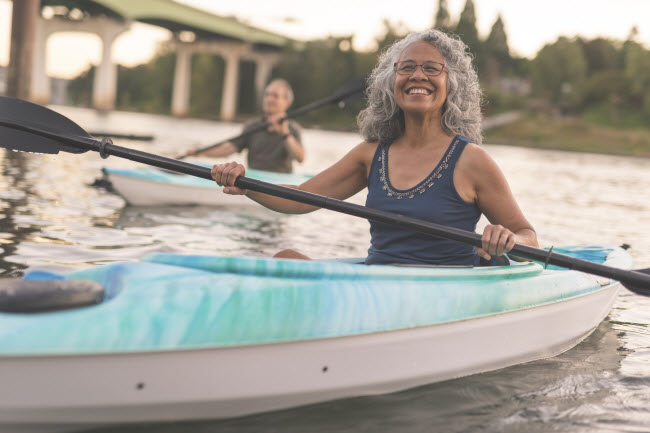When it comes to healthy aging, research shows that a busy brain and an active lifestyle are important for overall wellness and a happier, more fulfilled life. But for seniors who live alone or far from family, staying socially engaged, mentally stimulated and physically active can be a challenge. Besides a host of health problems, from broken bones and falls to digestive and circulatory issues, seniors are at risk for memory and mood disorders. According the National Alliance on Mental Illness, more than 6.5 million elderly Americans suffer from depression.
Keeping your brain busy and body active are keys to good health into old age. Whether you’re a caregiver, family member, friend, neighbor or senior, keep these tips in mind to not only help a loved (or yourself!) to stay well – but to thrive – throughout the golden years.
1. Keep moving!
A 2014 study published in the Journal of the American Medical Directors Association revealed that just one 60-minute dance class a week significantly improved feelings and symptoms of depression in nursing home residents. Walking, swimming and chair exercises (a great option if mobility is a problem) are easy-to-do activities that can keep you feeling good and thinking clearly. Taking an exercise class at a nearby gym or senior center combines exercise with social interaction and makes it easier to stay active for seniors who thrive on contact with others.
2. Spend time with family.
Spending time with family can be a problem if you’re separated from loved ones by distance or when busy lives make it hard for everyone to get together. Fortunately, technology has made it easy to stay in touch. Apps such as FaceTime and Skype put you in touch with family whenever you like, allowing for face-to-face contact and some valuable personal time. For example, grandchildren can show you their artwork rather than describing it over the phone. Social media is another convenient way to stay involved with loved ones.
3. Play brain games.
Games may seem like a trivial pursuit when it comes to staying mentally active, but jigsaw puzzles, crossword puzzles, Soduki and word games keep you thinking and learning. Consider starting a bridge or bunco club with friends so you can catch up on everyone’s lives and share problems while you play. Reading is also an excellent way to stay mentally sharp and pursue intellectual interests. If you prefer to discuss what you’ve read, consider joining a book club and share your thoughts and ideas with others. Staying mentally and socially active makes you less vulnerable to dementia and general mental decline.
4. Become a volunteer.
Donating your time to others who need help is a personally rewarding way to stay engaged and physically active. And there are many ways you can help local charities by donating your time or personal resources. Bear in mind that a lack of mobility needn’t be a barrier to contributing your time. Many organizations need help stuffing envelopes, or you can volunteer by reading to children in a local hospital.
5. Adopt a furry friend
Seniors often thrive on companionship with a dog or cat. Animals are a warm and furry source of unconditional love and support, and it can be personally rewarding to care for a pet. Older adults typically are less depressed and experience less anxiety when they have a dog, cat, fish or other pet to take care of. Think of it as animal therapy.
6. Get quality sleep.
Sleep is a building block of good health no matter your age. It’s rejuvenating, bolsters the immune system, aids cellular health and helps keep you mentally sharp throughout the day. Set up an environment that’s conducive to restful sleep: your bedroom should be dark, quiet and cool, and your mattress should provide proper support to allow you to get quality sleep. If you suffer from back pain, the type and age of your mattress is critical. Foam or memory foam mattresses tend to be the best option, as they help with lumbar support, pressure relief and body contouring. And don’t forget mattress maintenance: foam mattresses can last up to 10 years if you’re diligent about rotating them and keeping them clean.
7. Take dietary supplements.
As we age, it becomes harder for the body to gain many of the benefits derived from healthful foods. Vitamin supplements can help you get the vitamins, minerals, antioxidants, amino acids and phytonutrients your body needs. Supplements can be especially beneficial for seniors whose appetites are not what they used to be (which commonly happens with age). People generally have less need for energy intake as they grow older, due in part to a less-active physical lifestyle. However, eating less means potentially missing out on nutrients necessary to maintain good health.
Probiotics, calcium and vitamin D supplements are especially important for seniors. The central nervous system requires vitamins B2, B6, B12 and C to help for the metabolic processing of dopamine and noradrenaline. The immune system may also be impacted, which leaves seniors dangerously vulnerable to infection and viruses.




